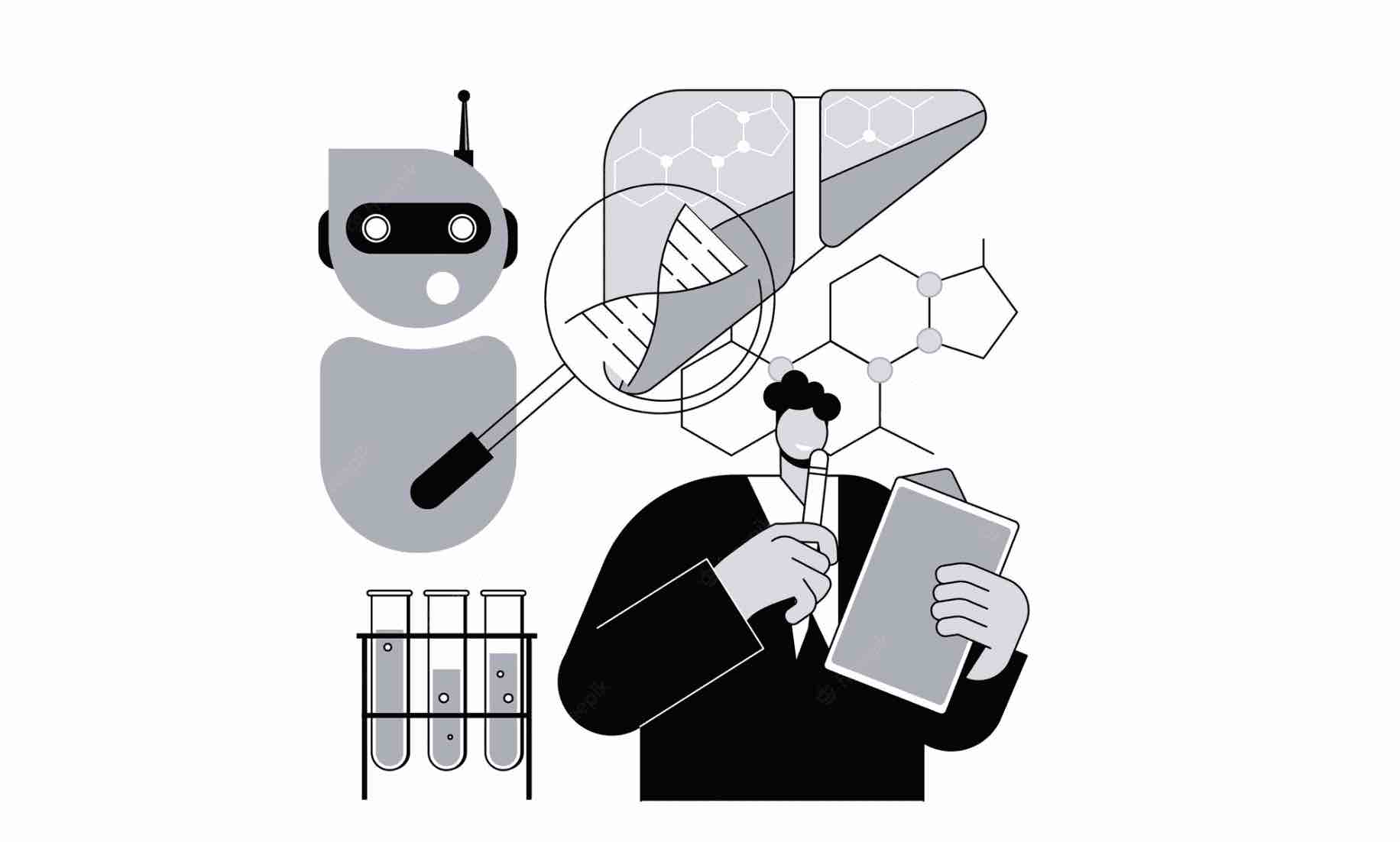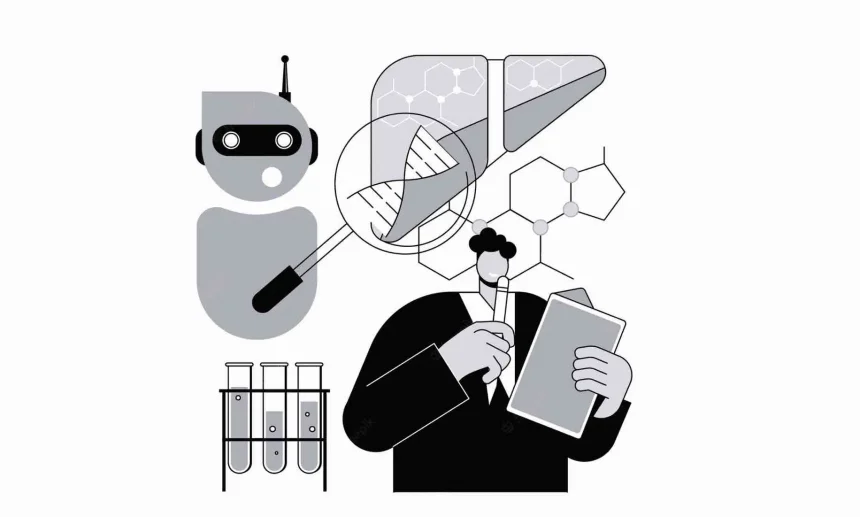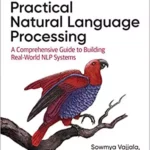
Introduction: The intersection of AI and drug discovery
How AI is finding new medicines? Drug discovery costs billions of dollars and is time-consuming for pharmaceutical companies. Choosing the most promising drug candidates to develop and bring to the market involves major risk assessments, and there are no guarantees that pharma companies are making the right decisions.
The advent of modern supercomputers and artificial intelligence (AI) technology over the past two decades has opened up opportunities in virtually every industry. Drug development and the pharmaceutical industry could be looking at a revolution rather than an evolution of their processes, with intelligent drug discovery on the horizon.
Today, developing a new drug and bringing this drug to market can take drug companies more than ten years. Biopharma businesses not only need to invest time in their drug development process. Their financial commitment is equally high. Experts estimate the average investment to be in the region of $1 billion for a completely new drug. By the time you add abandoned clinical trials and clinical failures into the development process, the cost may be as high as $2.5 billion for a new therapy.
AI could change that, and lead to a hugely positive impact on patients who could benefit from intelligent drug discovery. Patients stand to gain access to a wider selection of new drugs targeting complex diseases or cancer cells faster than ever before, increasing the chances of success of treatments. Bringing the technological capabilities and the ecosystem of tech startups to the pharmaceutical industry could change the way the world develops new medicines.
Quite simply, doctors and their patients could gain access to better drugs faster than ever before. There is also the promise of personalized medicine based on data collected from the patients themselves.
The current drug discovery process and its challenges
Currently, researchers discover most new drugs in one of these ways:
- Existing treatments delivering unexpected but welcome side effects on unintended targets
- New technologies allowing treatments to target specific sites of the body
- Different insights into the disease helping scientists develop a new way of targeting that human disease
- Testing of hundreds of chemical compounds to find a substance that is effective against specific diseases
Even though the traditional process is targeted and guided by data throughout, it can still be extremely time-consuming and wasteful. For any chemical compounds that are delivering the desired results, there are often hundreds that are abandoned by researchers at different stages of the process.
Once a promising compound has been found, the real work only starts, including experiments to determine how the human body deals with the drug, what the right dosage might be, and how best to deliver the medication to patients.
AI techniques in drug discovery
Industry experts believe that AI has the potential to cut the amount of time it takes to bring a new drug to a patient by 90%. Much of that gain comes from the ability of the technology to analyze vast quantities of data and derive potential predictions from this analysis.
It is important to note that AI is not there to replace humans but instead to increase both the speed and accuracy of drug discovery capabilities. Artificial intelligence does this by mimicking human behaviors such as learning and other cognitive functions. Some of the most promising approaches for biopharmaceutical companies come from within the AI subfield of machine learning.
Machine learning applies the concept of algorithms that learn without additional human input. AI-enabled drug discovery might also employ complex models or decision trees.
Once trained with enough data, machine learning algorithms create their own predictions and learn from the success of those. That means the AI would be able to improve on the concept algorithm and its predictions without further help. Legal regulation of machine learning is only just beginning.
Humans then join the process and evaluate the results, potentially benefiting from access to ideas and interpretations they would not have reached on their own. Within drug discovery, there is a wide range of areas with potential for AI applications:
- Drug design
- Chemical Synthesis
- Drug screening
- Polypharmacology, and
- Drug repurposing
Source: YouTube
Case studies: AI-driven drug discovery success stories
The majority of success stories in the area of AI-driven drug discovery and development currently relate to partnerships between pharmaceutical companies or biotech companies and artificial intelligence development groups. In fact, digital biotechs were at the forefront of the coronavirus vaccine development. They are also working on treatments for other complex diseases.
Pharma giants like Pfizer, Roche, and Bayer are at the forefront of these partnerships, having teamed up with IT leaders to create a dedicated platform for drug development processes. Efforts are currently focused on areas such as cardiovascular disease and immuno-oncology.
Others are holding back, potentially waiting for the first big impact on the pharmaceutical market, for example by decreasing the cost of drugs.
Also Read: First AI designed drug in human trials.
Challenges and limitations of AI in drug discovery
The efficiency of AI and MLhinges on the quality of the data used to train machine learning models and neural networks. This is where some of the biggest current challenges in the field stem from. Datasets relating to the drug development process in the pharmaceutical industry often involve millions of compounds or potential chemical structures.
Researchers believe that traditional machine learning tools may be unable to deal with these types of data. Other computational technologies can handle the data but do not offer the quality of predictions delivered by AI-based modes. As the technology develops and more pharmaceutical companies embrace investments in AI, these challenges will likely be resolved.
Future implications of AI in drug discovery
AI in drug discovery and development has the potential to help the industry bring drugs to the market faster and more cost-effectively than ever before. As a result, more patients could be cured faster, and more lives can be saved.
Another aspect of AI in medicine is the potential to personalize treatments far beyond current capabilities. While doctors today can prescribe different dosages to different people, truly personalized medicine would remove the aspect of trial and error from prescriptions. Instead, doctors could be sure that the drug they are prescribing is ideal for the patient in front of them and will not cause unwanted side effects.
Also Read: What Happened to IBM Watson?
Conclusion: The promise of AI in revolutionizing drug discovery
For the first time, modern supercomputers are making it possible for pharma companies to consider a new approach to drug discovery efforts. AI, ML, and decision trees have the potential to change clinical decision-making in the drug development field.
AI is already improving medical imaging and can also help in the search for organic molecules. Within years, this technology has the potential to transform current research and development engines into pharma future. What remains to be seen is how emerging legal frameworks will influence the regulation of machine learning.
References
Office of the Commissioner. “Step 1: Discovery and Development.” U.S. Food and Drug Administration, https://www.fda.gov/patients/drug-development-process/step-1-discovery-and-development. Accessed 27 Mar. 2023.
Contributors to Wikimedia projects. “Polypharmacology.” Wikipedia, 28 Jan. 2023, https://en.wikipedia.org/wiki/Polypharmacology. Accessed 27 Mar. 2023.
Devereson, Alex, et al. “Alex Devereson.” McKinsey & Company, 16 Nov. 2022, https://www.mckinsey.com/industries/life-sciences/our-insights/how-ai-could-revolutionize-drug-discovery. Accessed 27 Mar. 2023.
—. “Alex Devereson.” McKinsey & Company, 16 Nov. 2022, https://www.mckinsey.com/industries/life-sciences/our-insights/how-ai-could-revolutionize-drug-discovery. Accessed 27 Mar. 2023.
“How AI Could Speed Drug Discovery.” Morgan Stanley, https://www.morganstanley.com/ideas/ai-drug-discovery. Accessed 27 Mar. 2023.
Mak, Kit-Kay, et al. “Success Stories of AI in Drug Discovery – Where Do Things Stand? – PubMed.” Expert Opinion on Drug Discovery, vol. 17, no. 1, Jan. 2022, https://doi.org/10.1080/17460441.2022.1985108.
Paul, Debleena, et al. “Artificial Intelligence in Drug Discovery and Development.” Drug Discovery Today, vol. 26, no. 1, Jan. 2021, https://doi.org/10.1016/j.drudis.2020.10.010.
—. “Artificial Intelligence in Drug Discovery and Development.” Drug Discovery Today, vol. 26, no. 1, Jan. 2021, https://doi.org/10.1016/j.drudis.2020.10.010.
Prodramp. “The Role and Impact of AI in the Drug Discovery.” YouTube, Video, 5 Nov. 2022, https://www.youtube.com/watch?v=mJqBvwHlXpg. Accessed 27 Mar. 2023.
Research, Microsoft. “Research Talk: AI for Drug Discovery.” YouTube, Video, 8 Feb. 2022, https://www.youtube.com/watch?v=4mygq7Brtu8. Accessed 27 Mar. 2023.











